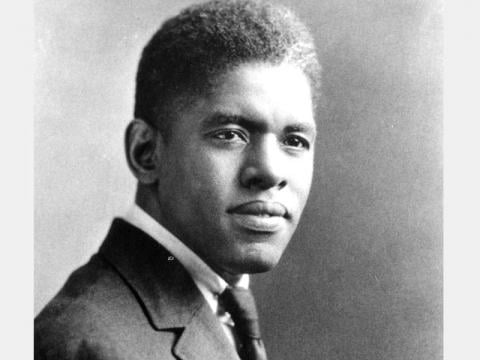GM – FBF – Today’s American Champion was an American lyric tenor and composer. Critics lauded his abilities and linguistic skills demonstrated with songs in French, German and Italian.Earlier African-American concert artists were not recorded because in their day recording companies were only interested in a vaudeville type of singer. He was one of the first to break this barrier and in 1939 he recorded with Columbia.. Earlier both Marian Anderson and Paul Robeson had recorded from the classical repertoire.His predecessors as well-known African-American concert artists, though not recorded because their performances were not minstrelsy, include Sissieretta Jones and Marie Selika.Today in our History – December 2, 1923 – Roland Hayes becomes the first black to sing in the Symphony Hall in Boston. The 1917 concert did not attract much public attention, but another in the same venue held on this day, was triumphant.The accomplishments of Roland Hayes, the first world-renowned African-American classical singer, have been overshadowed by some of those who followed him. But a new biography, called Roland Hayes: The Legacy of an American Tenor (Indiana University Press), may bring fresh attention to his career.Born on June 3, 1887 in rural Georgia to a former slave, Hayes is believed to be the first black classical musician to make a commercial recording. At his peak in the 1920s, he was the world’s highest-paid singer, reportedly making around $100,000 annually.He sang for European royalty and in prestigious concert halls around the globe, including Carnegie Hall, Wigmore Hall in London and Symphony Hall in Boston.Hayes was the first black person to sing with a major orchestra – the Boston Symphony – and the first to sing a command performance for the British Royal Family.Baritone Robert Sims, a co-author of the new biography, tells host Terrance McKnight that Hayes was a trailblazer for black classical musicians like Marian Anderson, Paul Robeson and Leontyne Price.”What he accomplished in the early 1900s – the 1920s were the height of his celebrity – no one else was able to do,” Sims said. “Through sheer determination, self-belief and drive…He was determined to have this career and he had it.”But even when Hayes became a successful artist, he faced the same prejudices as most African Americans at the time. During his tour of Germany in 1923, he encountered hostile audiences, including one at a recital in Berlin who mocked him for 10 minutes before he was able to sing. He eventually won them over with his nuanced singing of a Schubert song. Hayes also attempted to end the use of segregated seating at several concerts, including at Washington’s Constitution Hall in 1931. The hall officials subsequently decided to institute a no-blacks policy, which led to Marian Anderson’s famous rejection by the Daughters of the American Revolution from singing there (she then presented a legendary song recital standing on the steps of the Lincoln Memorial).In addition to singing opera arias and lieder, Hayes had the foresight to present spirituals in recitals, a practice that many prominent black singers still follow to this day.In this interview, Sims – who co-authored the new biography with Christopher A. Brooks – discusses Hayes’s upbringing, his musical training at Nashville’s Fisk University, and his shrewd business dealings (including self-funding and producing recordings on Columbia Records in the 1910s).We also hear about Hayes’s romance with a married countess, Bertha Colloredo-Mansfield, with whom he had a daughter. (He died in 1977.)Hayes idolized Enrico Caruso, and as we hear, there are certain resemblances vocally, though as Sims notes, “Hayes’s wasn’t a huge voice” by today’s standards. However, “here was a beautiful, medium-sized instrument, artistically fantastic with nuance and musicality. He took that all the way to the top.”Research more about this great American Champion and share it with your babies. Make it a champion day!

